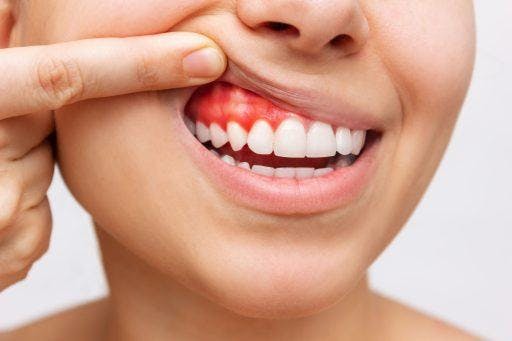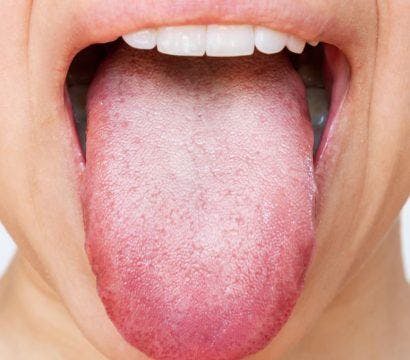Gingivitis often goes unnoticed until routine dental checkups, which typically occur only twice a year. Unfortunately, this delay in diagnosis can lead to serious oral health concerns. To prevent the progression of gum disease, stay vigilant and watch for gingivitis symptoms early on.
Read on for the telltale signs you should catch and rest easy with the knowledge that, by addressing your symptoms early, you can nip it in the bud.
What is gingivitis?
Gingivitis is the earliest stage and most common sign of periodontal disease, a condition affecting the gums and supporting structures of the teeth. If left untreated, it can progress to a more severe form called periodontitis.
While gingivitis is a nondestructive form of gum disease, you should still avoid it by any means. Make sure to look out for early symptoms of the illness.
7 early symptoms of gingivitis

Notice any of these gingivitis symptoms? Phone your dental care provider and schedule a checkup ASAP.
1. Gum inflammation and discolouration
If your gums become red or purple, then this is a literal red flag that you could be suffering from the beginnings of gingivitis. Swelling and a change in colour from the usual pink point to the presence of bacteria.
2. Tender and painful gums
During the early stages of periodontitis, gums may become swollen, tender, and painful to the touch. Pain when brushing against your gums is another symptom of gingivitis.
3. Bad breath
While certain foods can temporarily cause bad breath, regular brushing should eliminate it. But if you experience chronic bad taste and smell in your mouth, it may be a cause for concern.
Foul-smelling breath can be indicative of gingivitis or any of the following illnesses:
- Specific types of cancer
- Liver failure
- Renal failure
- Kidney disease
- Tuberculosis
- Diabetes
- Gastroesophageal reflux disease (GERD)
4. Bleeding gums
Gums don’t usually bleed when you practise proper oral hygiene. But if you notice bleeding when you spit after brushing or flossing, you may have gingivitis.
5. Pain when chewing
Many people associate jaw pain with temporomandibular joint disorder. Although true, TMD is not the sole cause of the pain you might experience while eating. Another culprit could be irritated and swollen gums, which make chewing extra challenging.
6. Receding gums
Do your teeth appear larger than usual? If so, gingival recession may be at fault. The visible recession of the gums isn’t just a natural part of ageing. Research indicates that “long teeth” is also a classic symptom of periodontitis.
7. Soft gums
Healthy gums are naturally firm. But when bacteria invade the tissues, they may become soft and spongy. This change in texture is another sign of gum disease you shouldn’t ignore.
The most common cause of gingivitis
The most common trigger for gingivitis is the buildup of plaque and tartar on the teeth. While it’s normal to have various bacteria in the mouth, improper oral hygiene allows harmful microbes to thrive. As bacterial plaque accumulates, dental complications arise.
Gingivitis complications
If left untreated, gingivitis can progress into periodontitis, a more severe and potentially irreversible form of gum disease. This can lead to other oral health issues, including tooth abscesses, tooth loss, and gum recession. Additionally, the bacteria responsible for periodontitis can enter your bloodstream and affect your heart, lungs, and other organs.
Remember – the power is in your hands. By visiting your dentist twice a year and keeping your oral health in optimum shape, you should steer clear of these gingivitis complications.
How to prevent gingivitis
The Journal of the American Dental Association offers the following tips to prevent gum disease:
- Brush and floss teeth every day.
- Visit your dentist regularly for consultation and deep cleaning.
- Ask a dental professional how you can improve your brushing and flossing techniques.
- Avoid smoking or chewing tobacco.
How to treat gingivitis

Managing and treating gingivitis is typically straightforward once a dentist diagnoses the condition. Some standard treatment options include:
Professional cleaning
Prophylaxis treatment involves the removal of plaque and tartar by an oral healthcare professional. During the procedure, dentists skillfully eliminate any buildup from your teeth and roots, then treat the area further with fluoride. In some cases, deeper cleaning below the gumline, like tooth scaling and root planing, is necessary.
Antibiotics
Stubborn and persistent gum infections that don’t respond to routine cleanings require prescription medication. Your dentist may recommend treatment in the form of a gel, mouthwash, or oral tablet.
Surgery
Chronic inflammation may require your dentist to recommend flap surgery. The surgical procedure involves lifting the gums to reach the teeth roots and cleaning any deposits in the area. Once complete, the dental surgeon sutures the flap back into place.
Besides these treatments, dentists may recommend orthodontic devices for patients with crooked teeth. Alignment issues create hard-to-reach nooks that foster bacterial growth. One solution is aligners like ClearCorrect that discreetly and effectively move teeth into their proper position in a matter of months.
ClearCorrect is one of the leading clear aligner systems that offers superior comfort. It features a unique tri-layer ClearQuartz material, a flat trimline, and other customisable features that work together for a fully personalised and effective teeth-straightening solution.
Take this online smile assessment to find out if you’re a candidate for ClearCorrect.
Early detection and prompt treatment of gingivitis symptoms can help prevent the progression of periodontitis. Take proactive steps to prevent gum disease and commit to better oral hygiene practices today. Doing so will not only give you a healthy mouth, but should lead to a great smile, too!
References:
Department of Health & Human Services. (n.d.). Halitosis or bad breath. Better Health Channel.
Is Bad Breath a Sign of Cancer? (n.d.). Roswell Park Comprehensive Cancer Center.
Keeping your gums healthy. (2015). Journal of the American Dental Association, 146(4), A46.
Tungare, S. (2022, August 22). Halitosis. StatPearls – NCBI Bookshelf.



